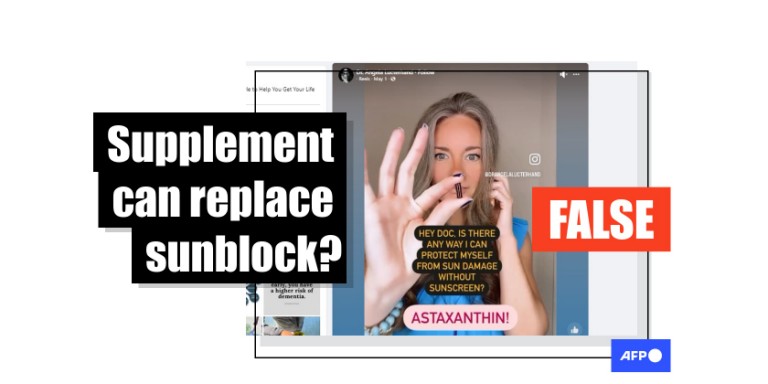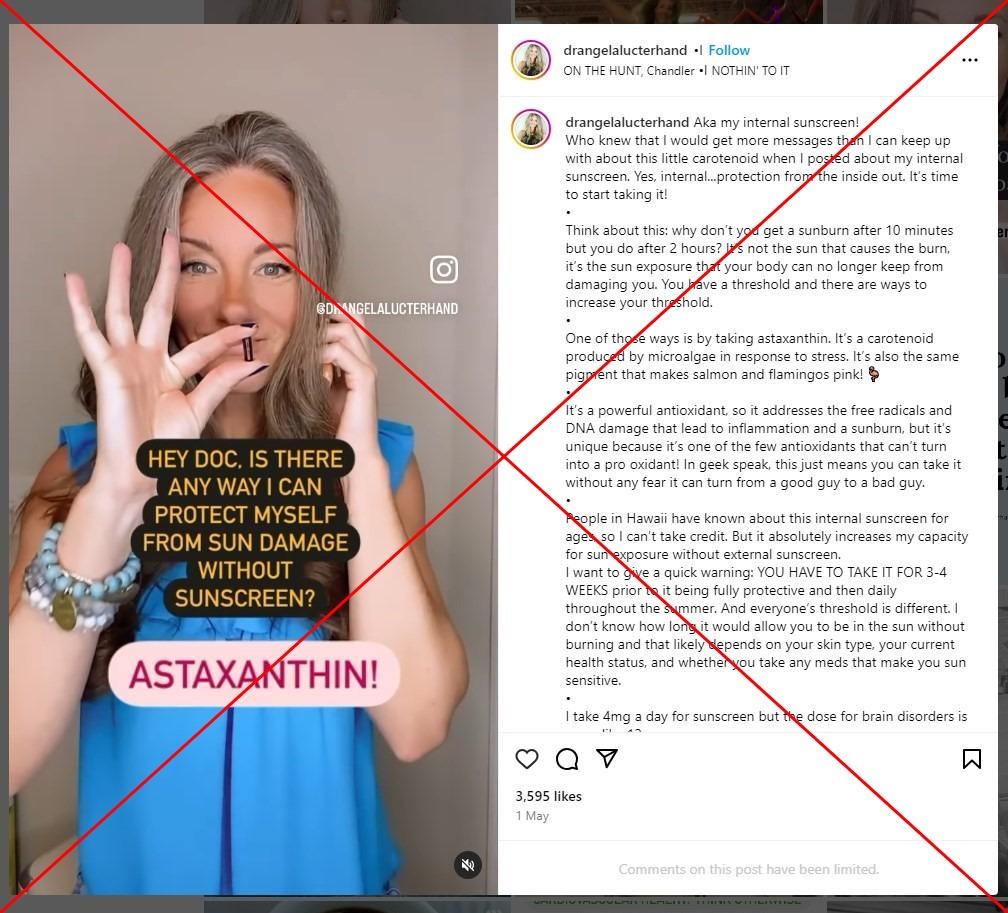
Claims of pills offering 'internal sunscreen' are unproven
Medical professionals agree that sunscreen is a key way to protect against skin cancer, but social media posts falsely claim the chemical compound astaxanthin, commonly found in some seafood, can replace topical lotions in preventing sun damage. No scientific evidence supports the claim, and dermatology experts told AFP that no ingestible agent replaces sunblock.
"Who knew that I would get more messages than I can keep up with about this little carotenoid when I posted about my internal sunscreen. Yes, internal...protection from the inside out," says a May 1, 2024 Instagram post from Angela Lucterhand, a chiropractor and alternative medicine practitioner in the US state of Indiana.
She claims astaxanthin increases the body's "threshold" for sun exposure.
Lucterhand, who uses social media to advertise alternative medicine treatments, appears to have been promoting the supplement since 2021 on Facebook (archived here).

The claim also appears on Tiktok, Facebook and blogs, with posts alleging that the antioxidant properties in astaxanthin will stop DNA damage caused by sunburn by increasing the body's "capacity for sun exposure without external sunscreen."
These posts are part of a broader trend of misinformation about sunscreen -- including false assertions of sunblock causing cancer.
Some research suggests astaxanthin may have benefits (archived here), including for skin health, but there is no scientific evidence that it can effectively replace sunblock, medical experts said.
"At this time, the data is not there for any type of oral agent to replace the typical photoprotection measure that we have, which is sunscreen," said Henry Lim, a dermatologist at Henry Ford Health in Michigan (archived here).
Lim told AFP no research has shown a significant or meaningful reduction of sunburn while ingesting the compound.
"To use this in place of sunscreen is totally inappropriate," he said on June 24.
Steven Wang, director of dermatologic oncology at Hoag Family Cancer Institute in California (archived here), agreed.
"There may be some truth about (astaxanthin's) ability to boost up the antioxidant reserve, but will it replace sunscreen? No," he said.
He said people can use niacinamide and polypodium leucotomos to work with sunscreen, but even those can not replace the topical solution.
FDA warning
The US Food and Drug Administration has previously warned consumers against products claiming to replace sunscreen with pills (archived here). In 2018, the agency ordered three companies to stop making claims of pills in place of sun protection.
"There's no pill or capsule that can replace your sunscreen," the FDA commissioner at the time, Scott Gottlieb, said in a statement.
The most common cancer in the United States is skin cancer, most of which is linked to too much sun exposure, according to the US Centers for Disease Control and Prevention (archived here). That includes melanoma, the deadliest form of skin cancer.
The American Academy of Dermatology encourages people to apply a broad-spectrum sunscreen with an SPF of 30 or higher to lessen UV ray exposure and help prevent skin cancer (archived here).
Wang said social media claims appeal to people looking for "a simple fix" to damage caused by UV rays but he doubts anything can replace sunscreen.
"Sunscreen basically blocks and absorbs UV radiation so you're reducing the amount of UV radiation hitting the skin -- it's the first line of defense," he said.
AFP has fact-checked other false and misleading health claims here.
Copyright © AFP 2017-2026. Any commercial use of this content requires a subscription. Click here to find out more.
Is there content that you would like AFP to fact-check? Get in touch.
Contact us
